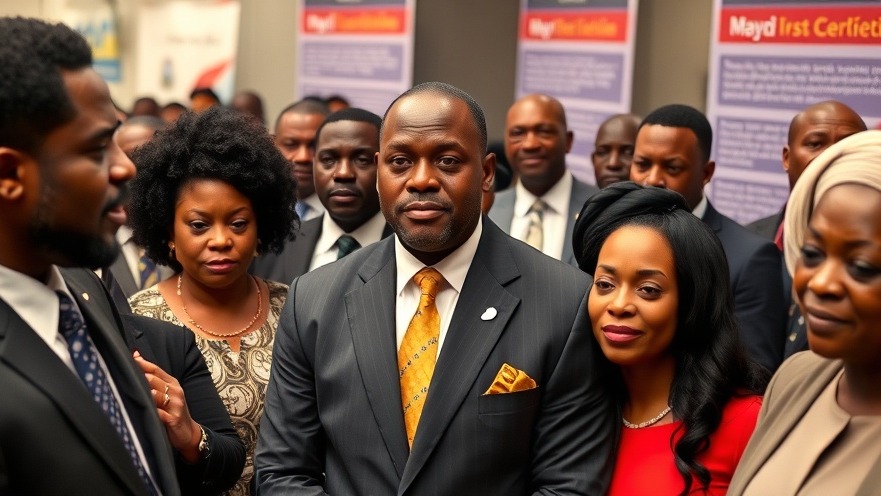
Cameroon's Political Landscape: A Pivotal Moment
In recent weeks, the political atmosphere in Cameroon has become charged as citizens flock to registration offices in a significant move towards the 2025 presidential elections. This surge in civic engagement is not merely a routine electoral exercise; it signifies a deeper craving for change among the populace—a sentiment sparked by years of disappointment due to economic stagnation and soaring unemployment rates. Young Cameroonians, in particular, have expressed disillusionment with a political system they perceive as stagnant, fueling a palpable desire for a new direction.
In Cameroon Election: Biya Runs for Eighth Term as CPDM Faces Crisis, the discussion dives into the political upheaval leading up to the 2025 elections, exploring key insights that sparked deeper analysis on our end.
The Enduring Shadow of Paul Biya
At the center of this political maelstrom is the veteran leader President Paul Biya, who at 92 years old stands as the world's oldest head of state. Biya's tenure has spanned over four decades, and as he announces his intention to run for an unprecedented eighth term, discontent grows not only among the opposition but within the ranks of his own party, the Cameroon People’s Democratic Movement (CPDM).
Biya cites overwhelming calls from supporters to continue his presidency. However, many question whether these calls are genuine or simply a product of fear and manipulation, as skepticism looms large regarding the aging leader's competence and health. Reports of corruption and scandals plague his administration, further eroding public trust.
Discontent Among Allies: A Divide in the Ruling Party
The situation has reached a critical juncture as key figures within the CPDM, like former minister Isaach Chiro Bakari and ex-prime minister Bellowamei, are breaking ranks. They have opted to challenge Biya, publicly denouncing the administration's failure to uphold public trust. Their defection, once unthinkable, has created an opening for fresh narratives in what is traditionally a tightly controlled electoral landscape.
This internal conflict highlights the declining strength of Biya's influence, signaling a potential power shift within the party. With every election cycle, the stakes heighten as the tarnished image of Biya and his administration contrasts sharply against the aspirations of a populace yearning for change.
Candidate Profiles: The Opposition's Stand
The upcoming elections slated for October 12, 2025, promise to feature a mix of familiar and new faces. Opposition leaders such as Mois Kamto and Joshua Usi are expected to vie for support, each embodying the frustrations of a disenchanted citizenry. As coalitions begin to form, it raises questions about the potential for a united front against Biya's CPDM.
Each candidate's vision could either align with or diverge from the public’s demand for reform. The electorate now stands at a crossroads, with the potential for a transformative election looming, offering Cameroonians a chance to redefine their country's future.
The Risk of a Stagnant Political Order
Despite the growing momentum for change, the political order in Cameroon remains formidable, bolstered by Biya’s historical grip on power. Dominating the elections is a legacy of unchallenged victories, often subverted by allegations of electoral manipulation and irregularities. As voters grapple with these paradoxes, the possibility that the status quo will endure genuinely concerns political analysts and hopeful citizens alike.
The overarching question remains—can this next election serve as a catalyst for a new era in Cameroon, or will the old political order prevail once more? Cameroonians are left contemplating whether genuine democratic reform is achievable or if they will once again face the age-old cycle of disappointment.
Call to Action: Engage in the Political Process
As the political narrative in Cameroon unfolds, it is crucial for citizens to actively participate in the electoral process. Engaging in dialogue, casting votes, and holding leaders accountable can empower the populace to seek the change they desire. The upcoming elections are not just another date on the calendar; they symbolize a possible renaissance for the nation.
In the context of African politics, Cameroon exemplifies the complexities faced across the continent, where many nations grapple with similar dilemmas regarding leadership and public engagement. Staying informed and proactive is paramount as observable shifts in political dynamics evolve.
 Add Row
Add Row  Add
Add 


Write A Comment